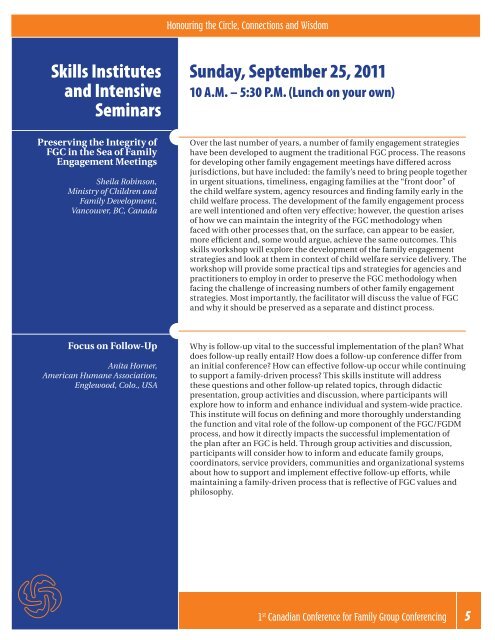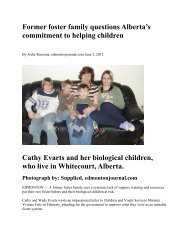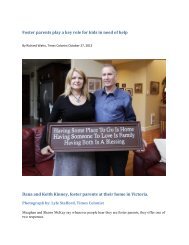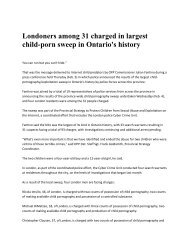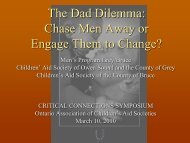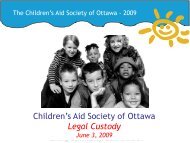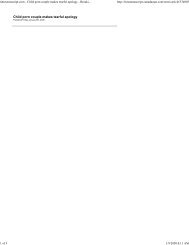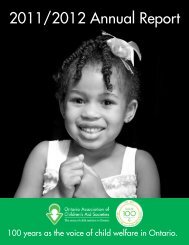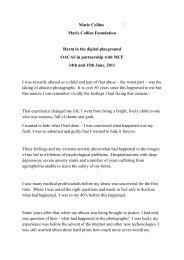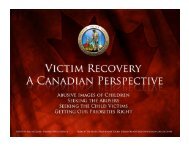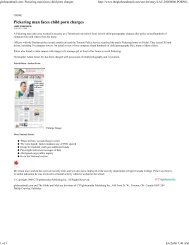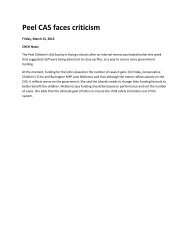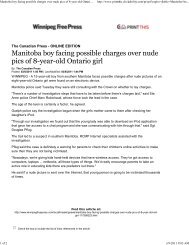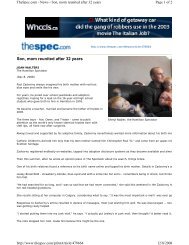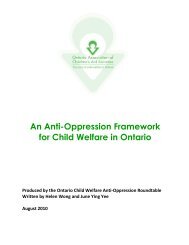PROGRAM GUIDE - American Humane Association
PROGRAM GUIDE - American Humane Association
PROGRAM GUIDE - American Humane Association
Create successful ePaper yourself
Turn your PDF publications into a flip-book with our unique Google optimized e-Paper software.
Honouring the Circle, Connections and Wisdom<br />
Skills Institutes<br />
and Intensive<br />
Seminars<br />
Preserving the Integrity of<br />
FGC in the Sea of Family<br />
Engagement Meetings<br />
Sheila Robinson,<br />
Ministry of Children and<br />
Family Development,<br />
Vancouver, BC, Canada<br />
Sunday, September 25, 2011<br />
10 A.M. – 5:30 P.M. (Lunch on your own)<br />
Over the last number of years, a number of family engagement strategies<br />
have been developed to augment the traditional FGC process. The reasons<br />
for developing other family engagement meetings have differed across<br />
jurisdictions, but have included: the family’s need to bring people together<br />
in urgent situations, timeliness, engaging families at the “front door” of<br />
the child welfare system, agency resources and finding family early in the<br />
child welfare process. The development of the family engagement process<br />
are well intentioned and often very effective; however, the question arises<br />
of how we can maintain the integrity of the FGC methodology when<br />
faced with other processes that, on the surface, can appear to be easier,<br />
more efficient and, some would argue, achieve the same outcomes. This<br />
skills workshop will explore the development of the family engagement<br />
strategies and look at them in context of child welfare service delivery. The<br />
workshop will provide some practical tips and strategies for agencies and<br />
practitioners to employ in order to preserve the FGC methodology when<br />
facing the challenge of increasing numbers of other family engagement<br />
strategies. Most importantly, the facilitator will discuss the value of FGC<br />
and why it should be preserved as a separate and distinct process.<br />
Focus on Follow-Up<br />
Anita Horner,<br />
<strong>American</strong> <strong>Humane</strong> <strong>Association</strong>,<br />
Englewood, Colo., USA<br />
Why is follow-up vital to the successful implementation of the plan? What<br />
does follow-up really entail? How does a follow-up conference differ from<br />
an initial conference? How can effective follow-up occur while continuing<br />
to support a family-driven process? This skills institute will address<br />
these questions and other follow-up related topics, through didactic<br />
presentation, group activities and discussion, where participants will<br />
explore how to inform and enhance individual and system-wide practice.<br />
This institute will focus on defining and more thoroughly understanding<br />
the function and vital role of the follow-up component of the FGC/FGDM<br />
process, and how it directly impacts the successful implementation of<br />
the plan after an FGC is held. Through group activities and discussion,<br />
participants will consider how to inform and educate family groups,<br />
coordinators, service providers, communities and organizational systems<br />
about how to support and implement effective follow-up efforts, while<br />
maintaining a family-driven process that is reflective of FGC values and<br />
philosophy.<br />
1 st Canadian Conference for Family Group Conferencing 5


